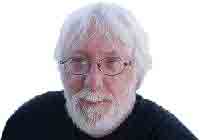
By Brian Rinker
July 28, 2012
When longtime reporter Bill Snyder joined a panel of fellow labor journalists during Laborfest, he brought along a copy of Moby Dick. When it was his turn to speak about the issues journalists face today, Snyder opened the book to an earmarked passage and began to read.
“Again, I always go to sea as a sailor, because they make a point of paying me for my trouble, whereas they never pay passengers a single penny that I ever heard of. On the contrary, passengers themselves must pay. And there is all the difference in the world between paying and being paid.”
For Snyder, being a journalist is about earning a living while producing the important stories that affect the world.

Bill Snyder.
“If you’re not getting paid, you’re not really engaging in a profession,” said Snyder, vice president of the Pacific Media Workers Guild Freelancer Unit.
Snyder and other reporters came together on July 17 to talk about the realities of working in the journalism industry today, as part of the month-long Laborfest conference being held in San Francisco.
The collapse of print media, combined with the rise of the Internet, has contributed to a boom in citizen journalism and blogging, as well as layoffs of thousands of newsroom staffers as advertising dollars have vaporized.
Despite the benefits of citizen journalism and emerging technologies, “if everyone is a journalist, nobody is a journalist,” Snyder said.
Employment in the media industry declined in the Bay Area by more than 43 percent between 2001 and 2010, according to a study by NOVA, a workforce development agency.
The study showed that 70 percent of dislocated journalists have turned to freelancing.
Those who weren’t laid off worked harder, for longer hours and less pay — often with no benefits and no job security.
Around 34 percent admit to working for free, either for non-profits, for-profits or for an entrepreneurial activity, according to the NOVA survey.
“Writers are literally writing for free,” said Larry Goldbetter, president of the National Writers Union Local 1981.
The biggest threat to the freelancer is getting stiffed, Goldbetter said, and journalists who haven’t been stiffed haven’t been freelancing long enough.
Goldbetter and his union are negotiating with Heart and Soul, a magazine focused on black women’s health, to get 20 reporters and editors paid. The magazine failed to pay their mostly freelance workforce more than $150,000 combined for their completed, published work.
Some news organizations don’t even pretend to pay.
The Newspaper Guild launched a seven-month protest in March 2011 against the Huffington Post for its practice of exploiting new media to get professional-quality reporting for free while the company turned hundreds of millions of dollars in profits.
Most recently, it engaged unpaid citizen journalists to cover the presidential campaign in its “Off the Bus” project.
“Journalists produce more than content—we also produce wealth,” Goldbetter said.
The unified message of the panelists was that writers need to demand payment for their work and to safeguard a fair wage through organizing.
“Never work for free,” said Rebecca Rosen Lum, unit chair of the Bay Area Guild Freelancers unit. “You can’t do quality work without getting paid.”
Working for free is like crossing the picket lines, according to guild members. It lowers the overall wages and drives a wedge between staffers and freelancers.
The guild offers organization, support, pursues grievances and provides dental and eye care benefits to its members. It also helps create policy through advocacy.
“We are part support group, part learning academy, part advocate,” Rosen Lum said.
Student journalist Natalie Orenstein has created a pretty good portfolio for herself. The senior at Ponoma College has had front page stories on the San Francisco Chronicle and a cover story for the San Francisco Bay Guardian. And she did it all for free.
Both publications provide unpaid internship programs.
Rosen Lum said there are exceptions to the rule when it comes to working for free, which include writing for non-profits, or personal projects. But she remains skeptical about unpaid internships.
Before Orenstein began interning at the Chronicle during the summer of 2011, she feared the rumors of the demise newsrooms would break her spirits.
But it wasn’t nearly as bleak as rumors suggested, she said.
She did see signs of financial hardships. The staff looked overworked and tired. Coffee in the break room cost a quarter. But it worked in her favor — she was able to get great front-page story assignments that would have previously gone to a staff reporter, she said.
Although, she admits, the work could have gone to a paid freelancer.
Many career experts agree that unpaid internships are an invaluable learning experience, but students should be wary.
If they don’t pay, make sure the organization provides education, new skills and tools you couldn’t learn in the classroom, according to a Poynter Institute article by career expert Joe Grim.
While there, Orenstein received invaluable support, advice and experience. She also got academic credit and didn’t mind working for free because she lived at home with her family and is still in school.
Yet many news organizations take advantage of student journalists by promising exposure without pay.
“Don’t go for that business that you’ll get exposure, make a name for yourself,” Rosen Lum said. “Journalists aren’t in the business of making a name for themselves anyway — our business is to get the story out.”
Independent journalist Alex Emslie agrees that the story is the most important part of journalism. But he doesn’t agree that a journalist should never work for free.
“I rarely request or demand to get paid,” Emslie said. “I am usually more concerned with getting stories published and out there than I am with the business side of journalism.”
Emslie is a senior at San Francisco State University and is currently in the process of running a non-profit online news magazine called Bay News Movement. Ideally, he would like to make a decent living as journalist.
While Emslie acknowledges that working for free lowers wages for working journalists everywhere, he doesn’t take personal responsibility for the financial collapse of the journalism industry.
“There are much larger forces at work, like broadcast journalism, which devalues and does more damage than freelancers working for free do,” he said, adding that democracy is what’s at stake, not fair wages.
“The work needs to get done,” Emslie added. “Journalism is too important of an industry that it should be left to the whims of the market.”
Journalists, both old school and new, agree problems plague the profession: lack of pay; exploitation of new media; massive layoffs; outsourcing; corporate consolidation and attacks on democracy are prevalent. The solutions, however, are not so clear.
“Sometimes being a journalist and labor activist feels like putting messages in bottles and throwing them out to sea.” Snyder said.


 The Hunger Site
The Hunger Site
July 29, 2012 at 6:15 pm
This is not true at all, although the definition of “work” is so vague that it’s difficult to understand what it’s supposed to mean.
“Never work for free,” said Rebecca Rosen Lum, unit chair of the Bay Area Guild Freelancers unit. “You can’t do quality work without getting paid.”
Never write for free? Someone should have told Dostoevsky. Someone should have reminded Van Gogh to stop painting despite the desperation that finally led to his suicide.And, you can do plenty of hack work and churn out plenty of propaganda for pay. I spend a lot of my time sifting through it to try to figure out what’s really going on in some of the distant conflicts that I constantly study and report on. Here’s a news piece I produced for KPFA 8 days ago that the young Congolese person I interviewed turned into a video: http://youtu.be/sIuLVBmBF9I There are only two explanations for network news anchor Tom Brokaw’s statement in that 2008 presidential debate: that the United States has no “national security” interests in D.R. Congo, Rwanda, or Somalia.
1) His ignorance is greater than anything I’d ever perceived before I turned off network news, or, 2) A highly placed propaganda team within the “national security” state helped Brokaw draft the disinformation script. Or, a combination of both could be true.
(Regarding the disinformation: The minerals essential to advanced weapons manufacture are more highly concentrated in eastern Congo than any place else in the world. Forty percent of the world’s oil tanker shipments pass by the Somali Coast on their way to the Suez Canal. And I’m not going to get started on Rwanda.) But, Brokaw got paid, very very well, to spew disinformation at Barack Obama and John McCain and millions of American viewers and voters in 2008.. While I am struggling along, mostly on contributions from people who hit the “Donate’ button on my website, as I sift through this kind of disinformation produced by those who are, like Brokaw, paid very very well. At the same time, I do survive on the contributions, just barely. Writing is not a simple labor issue.
July 28, 2012 at 8:51 pm
Brian,
You’re a writer if you can’t stop writing. Paid or unpaid. Just can’t stop writing because that’s the way you process the world. If you stop writing cause no one’s paying you then you really never were a writer. You were a posseur.
Go Giants!
h.
July 29, 2012 at 10:45 am
There’s a difference between writing for oneself and writing for a living.
July 29, 2012 at 4:31 pm
Really,
What might that difference be?
h.
July 29, 2012 at 5:38 pm
Yes, please elaborate, Fog City Journal.
July 28, 2012 at 8:38 pm
The National Writers Union (NWU) has been fighting for freelancers for over 30 years. We won the landmark Supreme Court case (Tasini v NY Times) establishing that freelancers own the rights to both print and electronic use of their articles. Our Grievance and Contract Division has won more than $1.5 million for our members. If you want to be part of community of writers, bloggers, book authors and tech writers that’s fighting for our future, go to http://www.nwu.org.
July 30, 2012 at 8:51 am
@Larryg601: What’s the difference between what the NWU and the Pacific Media Workers’ Guild do?